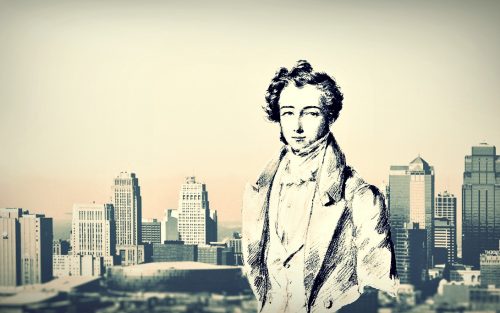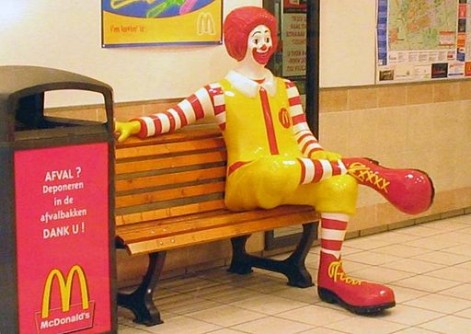It's hard to find a "serious" commencement speech that isn't about remembering that there's more to life than power and money. And that the secrets of a successful life include following your passion and finding purpose, not to mention giving back to your community. The president's speech at Morehouse had a few of these insipid moments, to be sure.
Still, you expect political leaders and public intellectuals to also aim higher. This challenge was especially daunting for President Obama at Morehouse. Morehouse, our leading historically black college, is about educating men. And the question is whether even our president can rise to a level that's impressive to such men, to classy gentlemen, to men who've been educated to know who they are and what they're supposed to do. Morehouse men are like Southern gentlemen, only better. They're better because what they've achieved has been in spite of the injustices they suffered, and because they've been ennobled by both their American and their African heritages. There's little more formidable than seeing that combination displayed in the highly disciplined and beautifully manly performance of the Morehouse glee club.
The president acknowledged all this by saying, "I am humbled to stand with all of you as an honorary Morehouse Man." His achievements, he humbly hopes, have made him worthy of the great honor men can bestow. He added, "I'm mindful of an old saying: 'You can always tell a Morehouse Man, but you can't tell him much.'" Why is that? Morehouse men have that "sense of pride" that gives them direction, that makes them courageous, generous and magnanimous. But it also makes them easily offended, especially by one who's not really--or only an honorary--one of their own.
The president spoke, he thought, to enlarge and refine their view of their greatness. But what did he tell them that they didn't already know?
Quoting the legendary Morehouse president Benjamin Mays, the president says that it isn't enough for Morehouse or any college "to produce clever graduates." Dr. Mays, notice, said college should make men clever and productive. But it should also "cultivate good men"--men who are honest and trustworthy "and are willing to accept responsibility for correcting" injustice and needless suffering in both public and private life. A good man assumes responsibility. And that's why the first Morehouse men became teachers and preachers. After all, political life and much of economic life were not open to them.
So what the president finds "unique" about Morehouse is the "sense of purpose that has always infused the place." That's "the conviction that this is a training ground not only for individual success, but for leadership that can change the world." I can't help but notice that the president is speaking less eloquently and precisely--and more grandiosely--than Dr. Mays. For Dr. Mays, character begins with honesty, and assuming responsibility can easily be more modest and local. It's tempting to say that the president reduced the proud Morehouse tradition to a platitude. But, to be fair, he doesn't do that consistently.
For the president, the model Morehouse graduate was Martin Luther King Jr. Some of what he says about MLK just isn't well crafted. But he does highlight what, from a proud or manly point of view, is the key thing the Morehouse Man who changed the world learned at college: "At Morehouse, as Dr. King later wrote, 'I realized that nobody...was afraid.'"
It really is true, as the president goes on, that the main thing Dr. King "taught others" was "to be unafraid." It's the courage of the Morehouse Man and the men he inspired that changed hearts and minds to the extent that an African American "can serve as President of the United States." It's that courage that's at the foundation of the more ordinary but still quite remarkable and unprecedented success in business open to Morehouse men today.
Yet, it's still the case, the president goes on, that the Morehouse Man's best contribution is "the power of your example." And he asks that man to use "that power for something greater than yourself." Another platitude! But the president does better: "it betrays a poverty of ambition if all you think about is what goods you can buy instead of what good you can do." I have to admit that "poverty of ambition" is a noble phrase that points in the direction of generosity and magnanimity. And magnanimity and generosity--more now than courage--are the virtues that should distinguish the successful Morehouse Man today.
The president might be faulted, at this point, for not praising the disciplined and clever virtues that allow one to make money, and especially for not praising Morehouse for graduating young men so well prepared to distinguish themselves in the world of work. And we'll also just excuse him for the gratuitous and unmanly commercial for ObamaCare. He is, after all, a politician, a member of a class that can't be expected to practice reliably the classy virtues.
The president, after all, does make it clear that he doesn't want assuming responsibility to be confused with treating others as dependents. The Morehouse Man should "inspire those who look up to you to expect more of themselves." If I were a Morehouse Man, here especially I would say you're not telling us anything new. Surely, Morehouse Men of proud personal responsibility have always tried to inspire all free and equal black men (and women).
The president speaks personally--although not specifically--of his own "bad choices" and how found excuses to avoid responsibility for them. He quotes "a common fraternity creed here at Morehouse: 'excuses are tools of the incompetent, used to build bridges to nowhere and monuments of nothingness.'" Blaming racism and so forth is a tool of incompetence. Not taking responsibility for who you are and what you can do makes you more incompetent--less a free and responsible man -- that you would otherwise be. The tougher your struggle, the more you have to depend on virtue and the more you're rewarded with proper pride when you succeed.
More than ever, the president claims, there's "no time for excuses." Here's why: "in today's hyperconnected, hypercompetitive world . . . nobody is going to give you anything you haven't earned. And whatever hardships you may experience because of your race. They pale in comparison in comparison to the hardships previous generations endured--and overcame." The news here is good and bad, but mostly good. The excuse of race-based hardship makes less sense than ever. We live, more than ever, in a meritocracy based on productivity. And that's thanks, in great measure, to the courage and competence of black men and women--particularly Morehouse Men--in the past.
It's here, finally, that the president praises the virtues connected with being productive, being judged according to the relevant qualities of character and competence--and nothing else--in today's rigorous competition for money and power. Surely some conservatives could go into a polemic against affirmative action here. But you couldn't expect a Democrat to do that, and that wouldn't have been classy for anyone, given the audience of justifiably proud black men. The Democratic president is certainly praising the ennobling challenges of a genuinely free market.
The remainder of the speech was rather uneven. I wish the president has stopped after he said: "You now fail from a lineage of legacy of immeasurably strong men. . . . They knew full well the role racism played in their lives. But when it came to their own accomplishments and sense of purpose, they had time for excuses."
Give the president his due. He showed himself, in his best moments, to be a Morehouse Man. He didn't tell his fellow men anything they didn't already know. But when it comes to praising noble, truthful displays of moral virtue, maybe there just isn't much new to be known.
The lesson for liberal education is that it isn't nearly enough to say mouth platitudes about the purpose of life being more than money and power, and that everyone should be socially responsible, have a cause greater than oneself, give something back, yada, yada. It's about teaching about and inculcating through example and disciplined learning what allows men to rise above their circumstances and take responsibility for themselves and those less fortunate. The president's speech is remarkable--and a lesson to every professor and administrator in the land--insofar as it has called to mind all that is great about the Morehouse Man.
This post originally appeared on mindingthecampus.com. It is reprinted here with permission of the author.






